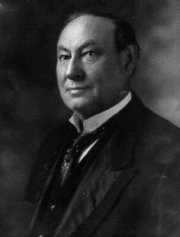Harvey W. Wiley
|
|
Harvey Washington Wiley (October 30, 1844, Kent, Indiana - June 30, 1930, Washington, D.C.) was a noted chemist involved with the passage of the landmark Pure Food and Drug Act of 1906.
Harvey Washington Wiley was born in a log farmhouse in Indiana, the son of a farmer. In 1863 he served with the Union Army in the 187th Regiment Indiana Volunteers during the American Civil War. A top graduate of Hanover College (1867), where he majored in the humanities, Wiley then studied at Indiana Medical College where he received his M.D. in 1871. After he graduated, Wiley accepted a position teaching chemistry at the medical college, where he taught Indiana's first laboratory course in chemistry beginning in 1873. Following a brief interlude at Harvard, where he was awarded a B.S. degree after only a few months of intense effort, he accepted a faculty position in chemistry at the newly opened Purdue University in 1874. In 1878, Wiley travelled overseas where he attended the lectures of August Wilhelm von Hofmann — the celebrated German discoverer of several organic tar derivatives, including aniline. While in Germany, Wiley was elected to the prestigious German Chemical Society founded by Hoffman. Wiley spent most of his time in the Imperial Food Laboratory in Bismarck working with Eugene Sell, mastering the use of the polariscope and studying sugar chemistry. Upon his return to Purdue, Wiley was asked by the Indiana State Board of Health to analyze the sugars and syrups on sale in the state to detect any adulteration. He spent his last years at Purdue studying sorghum culture and sugar chemistry, hoping, as did others, to help the United States develop a strong domestic sugar industry. His first published paper in 1881 discussed the adulteration of sugar with glucose.
Wiley was offered the position of Chief Chemist in the United States Department of Agriculture by George Loring, the Commissioner of Agriculture, in 1882. Loring was seeking to replace Peter Collier, his current Chief Chemist, with someone who could employ a more objective approach to the study of sorghum, the potential of which as a sugar source, was far from proven. Wiley accepted the offer after being passed over for the presidency of Purdue, allegedly because he was "too young and too jovial," unorthodox in his religious beliefs, and also a bachelor. Wiley brought with him to Washington a practical knowledge of agriculture, a sympathetic approach to the problems of agricultural industry and an untapped talent for public relations. After assisting Congress in their earliest questions regarding the safety of the chemical preservatives then being employed in foods, Wiley was appropriated $5,000 in 1902 to study the effects of a diet consisting in part of the various preservatives on human volunteers. These famous "poison squad" studies drew national attention to the need for a federal food and drug law. Wiley soon became a crusader and coalition builder in support of national food and drug regulation which earned him the title of "Father of the Pure Food and Drugs Act" when it became law in 1906. Wiley authored two editions of Foods and Their Adulteration (1907 and 1911), which detailed the history, preparation and subsequent adulteration of basic foodstuffs to a broad audience. He was also a founding father of the Association of Official Analytical Chemists, and left a legacy to the American pure food movement as its "crusading chemist" that was both broad and substantial.
The fact that enforcement of the federal Pure Food and Drug Act of 1906 was given to the Bureau of Chemistry rather than placed in the Department of Commerce or the Department of the Interior is a tribute to the scientific qualifications which the Bureau of Chemistry brought to the study of food and drug adulteration and misbranding. The first food and drug inspectors were hired to complement the work of the laboratory scientists, and an inspection program was launched which revolutionized the country's food supply within the first decade under the new federal law. Wiley's tenure, however, was marked by controversy over the administration of the 1906 statute which he had worked so hard to secure. Concerns over preserving chemicals, which had not been specifically addressed in the law, continued to be controversial. The Secretary of Agriculture appointed a Referee Board of Consulting Scientists, headed by Ira Remsen at Johns Hopkins University to repeat Wiley's human trials of preservatives. The use of saccharin, bleached flour, caffeine, and benzoate of soda were all important issues which had to be ultimately settled by the courts in the early days under the new law. Under Wiley's leadership, however, the Bureau of Chemistry grew significantly, both in strength and in stature after assuming responsibility for the enforcement of the 1906 Act. Between 1906 and 1912, Wiley's staff expanded from 110 to 146 and in 1910 the Bureau moved into its own building. Appropriations, which had been only $155,000 in 1906 were $963,780 in 1912.
In 1912, Wiley resigned and took over the laboratories of Good Housekeeping magazine where he established the Good Housekeeping Seal of Approval and worked tirelessly on behalf of the consuming public. Harvey Wiley died at his home in Washington D.C. in 1930, and was buried in Arlington National Cemetery.

